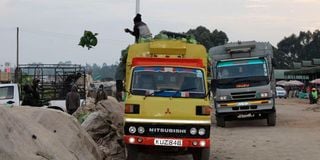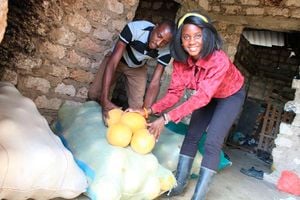
Trucks wait to load and offload fresh farm produce at Soko Mpya market, Nyandarua.
With trucks bearing Kenyan and foreign plates, matatus, Probox, vehicles of all types and motorbikes dotting Soko Mpya market, it could easily be mistaken for a busy garage or showroom.
But the owners of the vehicles are either unloading or waiting to pick up goods at what was once a makeshift roadside market structure, but is now a bustling regional trading hub.
Soko Mpya has transformed from a few women selling bananas, kales and tomatoes in a small scale to a swarmed market bustling with activity.
Located in Magumu in Nyandarua County, along the busy Nairobi-Nakuru to Western Kenya highway, Soko Mpya is marking its first decade this year, rivaling the popularity of Marikiti market in Nairobi, which was established in 1966.
The market was built in 2014 through a partnership between the government, International Fund for Agricultural Development and the Small Holder Market Access Programme, alongside similar projects in Oleriondo in Ol Kalou and Ndaragwa constituencies.
On completion, the market was handed over to the county government under the department of agriculture, but has since been taken over by that of trade and cooperatives.
At the time, however, fewer than 100 traders moved to the newly constructed market, with many opting to stay at Soko Mjinga, about 100 metres away in Kiambu County.
Today, however, Soko Mpya is severely congested and in dire need of expansion to accommodate the growing number of traders.
In an interview with Nation.africa, Mr Dembe Baingana, a 15-year experienced truck driver from Uganda, explained why he switched from plying the Nairobi route to Soko Mpya.
“This market is strategically located. It’s not as difficult to access as Marikiti in Nairobi where I delivered farm produce for over 10 years. I started operating from Soko Mpya about two years ago. It is convenient, with no traffic jams. It’s better managed and organised, and we don’t feel harassed here by traders, buyers, or the government,” he said.
Mr Jaali Haki, another truck driver, said there are more business prospects at Soko Mpya compared to other markets.
“Unlike other markets where we only offload, at Soko Mpya we offload and load fresh produce, making business sense. I have just offloaded onions, I am now waiting for my customer to buy French beans and other vegetables to take back to Tanzania, in other markets, I would just have offloaded and driven back to Tanzania or used additional fuel visiting the farms to buy what I need to take back with me to Tanzania,” said the driver.
The earliest arrivals at the market by 5am are matatus and Probox cars that fetch fresh food for sale in other markets, including Nairobi, Nakuru, Maralal, and parts of Western Kenya.
Trucks also bring and collect groceries and other food items for distant markets such as Machakos and the coast.
Mr Mungai Karoki, an official at the market, said the centre is growing rapidly.
“We have noticed business and infrastructural developments, creating an even more business-conducive environment. But a lot needs to be done, a priority being to purchase additional land for expansion. The market has an average of 2,000 traders at any given time, it’s a busy day and at night,” said Mr Karoki.
He says that through the county government interventions, all traders operate from the sheds, the county has also constructed an eco-toilet, and the governor has also promised to have the market installed with cabros.
“We have some sheds yet to be connected to electricity which Nyandarua Governor Kiarie Badilisha promised to address. But the main challenge is space, with the purchase of additional land, we will have enough parking for the trucks and a matatu stage.
"We have seen the goodwill portrayed by the county government in expanding to meet the regional status it has acclaimed, a lot has been done in the last year, and we appreciate, but hope that other remaining issues will be addressed sooner,” said the trader.
He says the growth has also accelerated land prices, especially in the last year, with a quarter-acre plot selling at Sh1.5 million up from Sh500 and Sh600 two to three years ago.
Governor Kiarie acknowledged the market's growth and the need for expansion.
“What matters to us is not just how much we collect in revenue, but the business and opportunities presented by the growth of Soko Mpya market. It has already claimed its position as a regional trading hub. Expansion is our next move,” said the county boss, noting that various county government departments are involved in the expansion plan.
“Our agriculture and trade departments are working together with cooperative societies to ensure quality produce. We want buyers to identify with Nyandarua farm produce,” he added.
The market is currently undergoing a Sh14 million upgrade which includes the installation of electric wind barriers to make Soko Mpya weather-friendly to buyers and traders.
In the expansion plan, the small-scale traders, hawkers and vendors will have designated places.
Other improvements include setting up cold storage, an office, drainage system, borehole, water harvesting, storage facilities, masts and floodlights, and hand-washing facilities.
Trade and Tourism Chief Officer David Wakaba said the market has attracted other investors in cereals, household items, electronics, chemists, retail shops, eateries, clothing and footwear, and packaging materials.
“We have found it necessary to have a livestock market at Soko Mpya due to the high number of visitors. Butcheries are doing good business. This has been a stopover by commuters along the route.
“Soko Mpya is now a one-stop shop where you can get anything you want, we have young people selling seedlings, working as loaders, and transporters using motorbikes, bicycles, lorries, matatus, donkeys, and hand carts. We have traders bringing their produce from all over the country, everything you need you find at Soko Mpya,”said Mr Wakaba.








